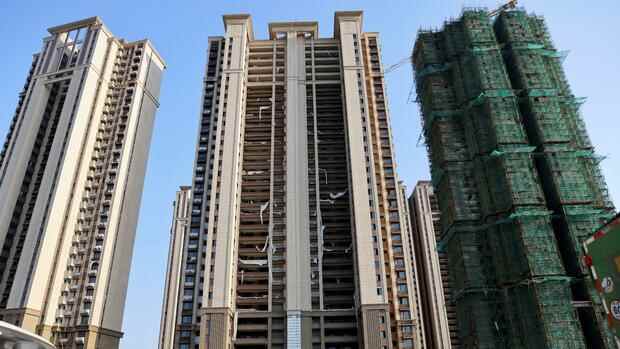A default of the 300 billion dollar indebted company can hardly be prevented, analysts warn.
(Photo: Reuters)
Frankfurt It is an old Chinese proverb that the great leader of the Communist Party Mao is said to have used many times: “Killing a chicken to frighten the monkeys”. This stratagem fits very well with what the communist government of the People’s Republic is doing in the real estate market.
On the one hand, it is about setting an example and making it clear that the excessive debt and wild speculation in the overheated real estate sector are finally over. On the other hand, the shock must not be so great that financial stability is immediately jeopardized.
At the center of this drama is the evergrande real estate group, which has run into financial difficulties. It is now clear that the $ 300 billion indebted company will hardly be able to avoid a default. At least the international creditors have to prepare for a painful haircut – and that is causing a lot of unrest in the markets.
The Chinese government is pursuing a finely nuanced strategy to allay these concerns. On the one hand, it denies Evergrande a state rescue. At the same time, however, Beijing is signaling its firm will to limit the consequences of the crisis as tightly as possible. Virtually all the relevant authorities from the central bank to the financial supervisory authority have recently emphasized that Evergrande is an isolated case, for whose plight the inability of the management is primarily responsible.
Top jobs of the day
Find the best jobs now and
be notified by email.
US Federal Reserve warns of global risk of contagion
On a very small scale, the government is signaling its willingness to help with the intervention of the regional authorities directly at Evergrande. On a large scale with a significant easing of the financing conditions in the entire banking sector.
So far the strategy seems to be working. Investors are still differentiating: Smaller, weaker Chinese real estate groups are having more and more problems with international refinancing, but the heavyweights in the industry have been doing very well so far.
But it doesn’t have to stay that way. The US Federal Reserve has already warned of a global risk of contagion if problems in the Chinese real estate market spread. But the domestic risks are not negligible for the government in Beijing.
Real estate is responsible for a quarter of annual economic output and three quarters of household wealth. A full-blown crisis in this market would not only have a serious negative impact on the economy, it could also pose a threat to social peace and thus the greatest assumed stability risk for the communist party.
More: China’s foreign trade is growing strongly – but Germany is hardly benefiting from it
